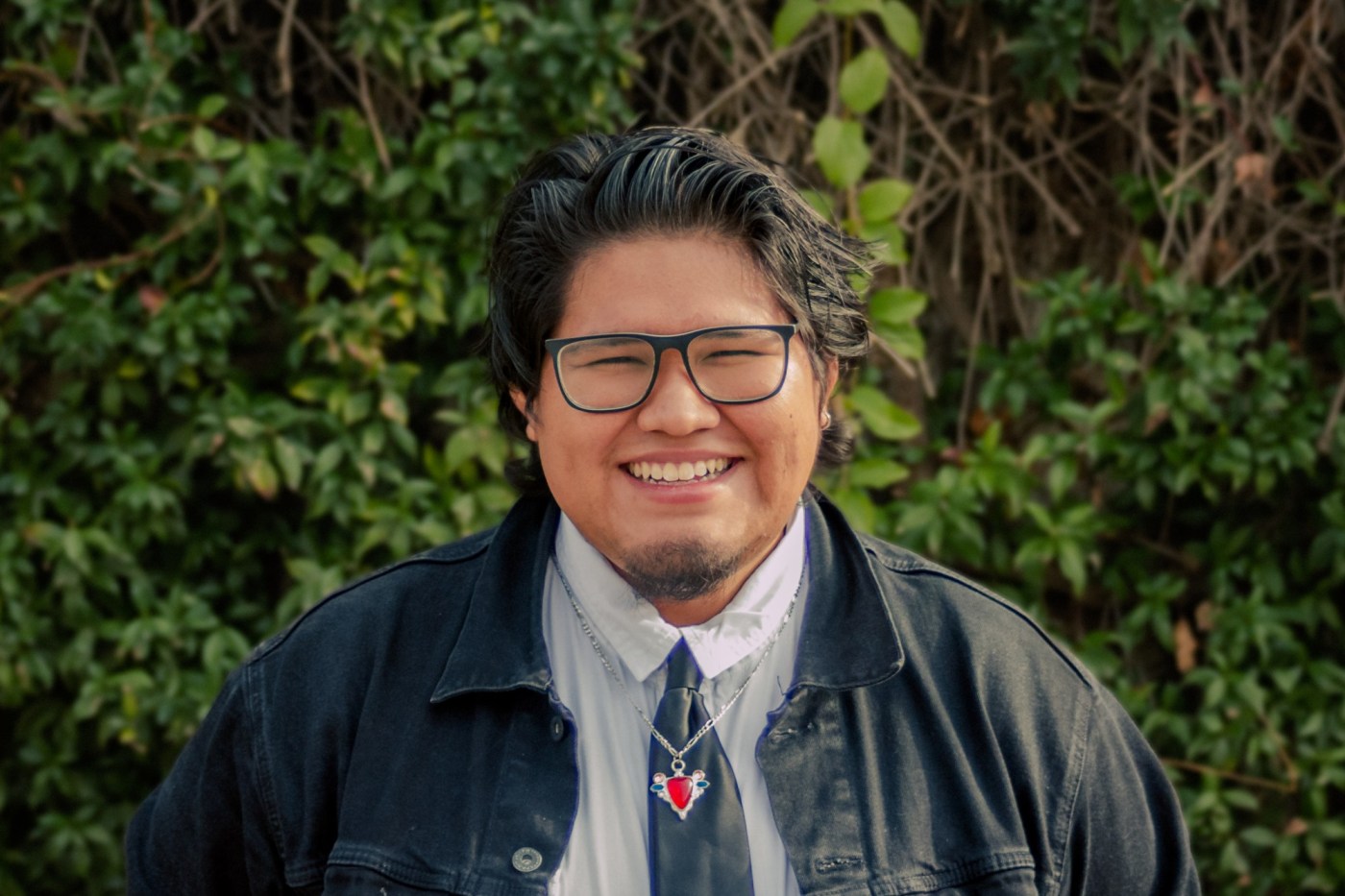When Omar Diego Bello, 22, transferred to Cal State Fullerton from Cypress College, his goal was simply to become a high school math teacher.
Since then, that goal has broadened. Inspired by his experience in STEM programs supporting underrepresented minorities and by professors who guided him to take on challenging research, Bello and his research colleagues last year presented their work at the Research in Undergraduate Mathematics Education Conference in Boston.
This year, Bello is contributing valuable research on bias embedded in AI for a major collaborative project called —an G𝜋T: Generative Practice Interview TrainerAI bot that will be programmed to perform mock job interviews with students so that they’re prepared for real interviews when they look for work.
“Ever since I participated in research with Project RAISE (regional alliance in STEM education) and Dr. Roberto Soto, I began to be interested in the intersection of ethnic studies and mathematics, this being called ethno-mathematics,” Bello said. “This has led me to think about pursuing a Ph.D.”
His interest in math and ethnic studies was sparked when Bello once worked as a high school math tutor as part of CSUF’s GEAR UP program.
“When I walked around as an in-class tutor, I noticed that some students would check out and immediately lose interest when it came to equations and formulas,” Bello said. He began to think about this observation from a researcher’s perspective and saw the problem was not that the students couldn’t connect with math. Rather, math was being taught in a way that did not align with the students’ thinking.
“That’s when I began considering how to help students see themselves within math and stay engaged with it,” Bello said. “I believe ethnic studies is a solution where we can make math feel more relevant to students by making it connect with their culture, traditions, and lived experiences.”
Bello’s current role in working on G𝜋T: Generative Practice Interview Trainer is focused on mitigating biases that are common in AI tools. Studies show that AI tools mimic human biases, such as assumptions about the abilities of certain groups of people to perform certain jobs.

are, from left, Francisco Zepeda, Sunny Le, Edward Watson, Matheus Guerrero and
Alison Marzocchi. (Photo courtesy of Cal State Fullerton)
Led by Alison Marzocchi, CSUF professor of mathematics, the AI interview trainer project is funded by the California Education Learning Lab.
To get funding for research into AI biases toward certain groups of people, Bello wrote a grant proposal to the Undergraduate Research Opportunity Center, also known as UROC. He worked with Marzocchi and research teammate Giselle Cortez-Tlaxcuapan to refine the proposal, which UROC approved.
“Giselle and I are leading the student research cohort where we will be mainly looking at research on ethics and analyzing transcripts to mitigate AI biases,” said Bello, adding that he particularly enjoys thematic analysis of research.
The AI interview trainer project is an interdisciplinary collaborative effort, with a team that includes five faculty principal investigators representing mathematics education, statistics, and sociology, and five student researchers representing mathematics education, applied mathematics, criminal justice, and computer science, Marzocchi said.
“As it turns out, now that we are expanding our literature review, we’ve learned that having a diverse team to develop and assess AI tools is a best practice for mitigating biases and developing an ethics-minded tool,” she said.
Working collaboratively is proving beneficial to everyone involved.
For students, it allows them feel connected to a community and having a team and home base within the larger university, said Marzocchi, and listed other plusses as “having a direct line of communication to a faculty member you’re seeing every week, learning to work collaboratively, developing your confidence through conference presentations, adding impressive items to your resume, and preparing for graduate school and beyond.”
The project also allows faculty to work with talented students like Bello and Cortez-Tlaxcuapan.
“At this point, Giselle, Omar and I have conducted research together under four different funding opportunities,” Marzocchi said. “They are my research partners and collaborators. I respect and trust them so much, and I am so grateful for the ways they’ve shaped our research and contributed to the body of human knowledge.”
Bello grew up in Anaheim, and as the first in his family to attend college, he credits his parents for encouraging and supporting him. “Reflecting on their struggles as immigrant parents and knowing that they sacrificed everything when moving here from Mexico, leaving their hopes and dreams, I’m grateful for their sacrifice, and I hope I am the brighter future for them,” he said. “I am thankful for them telling me I have a good heart and that I should always take advantage of any opportunities that come my way, which I would say comes from their love.”
Bello is on track to graduate in May 2026 and plans to apply to graduate school.
